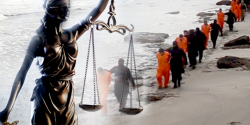Published: 04.07.2017

Report of the Ordo Juris Institute: "Persecutions of Christians: Time to React to Genocide” leaves no illusions - persecution of Christians is a fact that is a hot potato on the international forum. However, the time has come for the international community to respond accordingly and to use the right instruments to adequately punish the perpetrators and stop the genocide. Membership of our country in the UN Security Council gives Poland a unique opportunity to initiate action in the international arena to defend the followers of Christ killed because of their faith.
Report of Ordo Iuris - aim and main conclusions:
Christians are the most persecuted group in the world - this unequivocal conclusion stems from global research conducted by non-governmental organizations such as Open Doors and The Center for Studies on New Religions. The followers of Christ fall prey to murder, rape, looting and expulsions from places of residence only because of their religion.
Main conclusions concerning the persecution of Christians:
The report entitled "Persecutions of Christians: Time to React to Genocide" focuses in particular on the problem of impunity of perpetrators of the bloodiest persecution, filling the constitutive elements of genocide.
Genocidal character of ISIS activities:
The gravest manifestations of persecution of Christians can be seen in the Middle East. The report presents data illustrating the acts of Islamic extremists, especially those operating in the criminal organization ISIS/Daesh.
Despite the tendency to belittle the scale of persecution, genocidal nature of ISIS activities was emphasised in official political positions. In 2016, after several years of efforts, such positions were taken by: the Parliamentary Assembly of the Council of Europe (resolution I.2016), the European Parliament (resolution II.2016), the House of Commons, the Parliament of the United Kingdom (IV.2016), the Polish Parliament (Resolution XII .2016), the Lower Chamber of the Austrian Parliament (VI.2017).
Why does the West not respond effectively?
The topic of the persecution of Christians does not, unfortunately, exist in political debates in the West, it almost does not appear in the free media. It is completely replaced by the issue of migrants who are heading to Europe. One can get the impression that neither politicians nor journalists are interested in voicing this concern. This cannot be explained only by human indifference to crimes, including crimes of genocide. This situation reveals the specific attitude of contemporary West to Christianity. Organized attempts to marginalize the impact of Christianity on European politics and culture are one of the causes of selective sensitivity to human rights abuses in Europe and the world.
Possible instruments for prosecuting Christian persecutors:
In the global arena, the International Criminal Court (ICC), established in 1998 by 120 countries around the world on the basis of the Rome Statute, could be of greatest importance. It is to prosecute the most serious offenses, especially the crimes of genocide. However, the crimes committed by the Islamic State go beyond the jurisdiction of the Court, as Syria, Iraq and Lebanon are not signatories to the Rome Statute.
In Europe, the most effective solution would be to empower the courts and prosecutors of all states to prosecute and judge Islamic criminals irrespective of where they commit crimes. Such a solution (so-called principle of universal jurisdiction) is applicable in some European countries, such as Finland, Germany or Spain. Most often, however, it is limited to the situation where the victim of the crime is a citizen of a given state. This caveat significantly limits the possibility of using it in prosecuting crimes against Christians in the Middle East.
Unlike the EU, which has very limited competences in the area of justice, the UN applies proven measures against such acts of lawlessness as crimes against humanity. Within the UN, the most effective means are at the disposal of the Security Council. It is this body that, as part of a peacekeeping mission, can decide to send international armed forces into territories engulfed by serious conflicts or persecutions.
In particular, however, the Security Council's competence to establish, by way of resolution, an international criminal court to condemn crimes against humanity, including the crimes of genocide committed in a specific area (ad hoc tribunal), appears to be of particular relevance.
The ad hoc court's jurisdiction would be extended to all UN member states and have priority over the jurisdiction of national courts.
Poland's membership in the UN Security Council in the years 2018-2019 is of great importance. The Government of the Republic of Poland has a historic opportunity to submit the motion to establish an ad hoc tribunal to judge the crimes of ISIS and thereby to stop the mass persecution of the followers of Christ.
The report can be downloaded from http://persecutionofchristians.ordoiuris.pl .

- According to polls, a majority of Poles support an increased legal availability of prenatal killing than the public has access to at present. This support fluctuates, however, depending on how a poll’s questions are formulated.

- Spanish authorities have banned public prayer, including the recitation of the rosary for the homeland. The decision is in response to mass protests by the population expressing opposition to the amnesty of Catalan separatists.
- States, by introducing legislation criminalising silent prayer, are violating the right to freedom of thought and conscience, which is a fundamental human right.

The Finnish Court of Appeal acquitted former Interior Minister Päivi Räsänen, who was accused of hate speech. The charge concerned a post on the 'X' platform (formerly Twitter) containing a passage from Scripture criticising homosexual practices and quotes from a publication issued in 2004 on marriage and sexuality. The criminalisation of speech through legislation on an undefined concept such as 'hate speech' has the potential to restrict the right to freedom of expression and thus poses a serious threat to democracy.

· The District Court in Kraków has dismissed IKEA's appeal against a judgment ordering the reinstatement of Janusz Komenda, an employee dismissed for quoting the Bible.
· In December 2022. District Court in Kraków found that the dismissal was unlawful and ordered Janusz Komenda to be reinstated.
· The Court of Second Instance confirmed that the dismissal was unjustified.